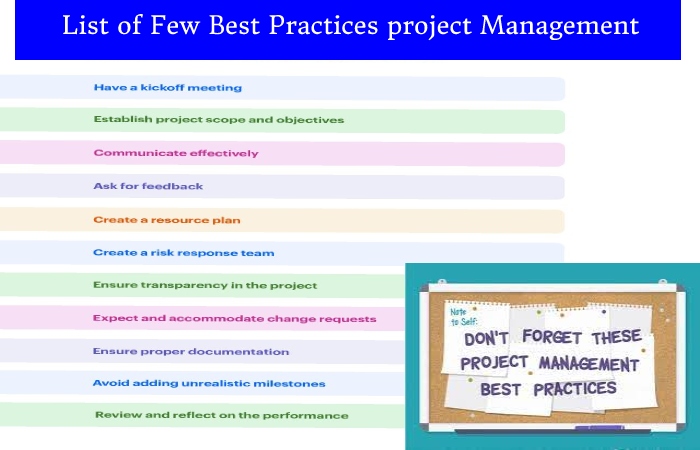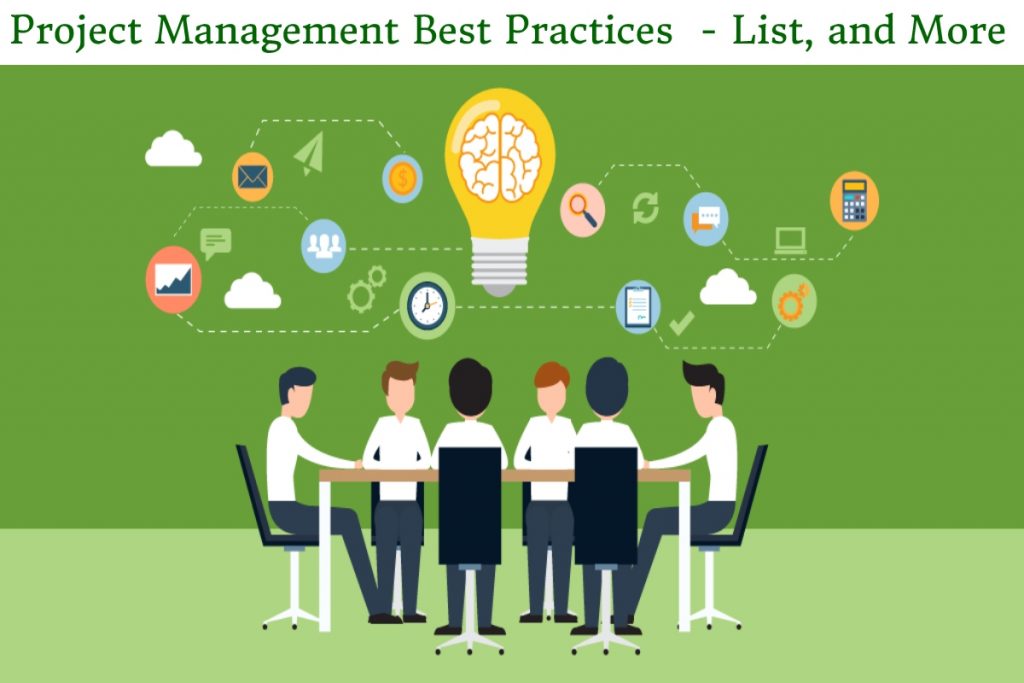Project Management Best Practices
Project management best practices – If you are a project manager, developing and implementing best project management practices is probably one of your top priorities. This article provides a comprehensive list of project management best practices that every business needs.
Effective project management is usually the “secret” to an agency’s success, rather than mere creative brilliance.
Typically, to be good at managing projects, you need to follow the best project management practices. These “best practices” are generally derived from project management methods, international standards, industry conventions, and organizational guidelines from previous designs.
As PMI says, any way of beginning things within an organization can be considered a best practice. These “best practices” often differ from company to company. However, some are cross-organizational and can dramatically improve project performance.
List of Few Best Practices project Management

Make sure everyone involved understands the conditions
A standard part of failed projects is a lack of uniform understanding of project requirements among stakeholders. If your project team and your client assess the project scope differently, you will run into trouble.
To solve this problem, bring everyone involved in the concept phase:
- What are the results of the project?
- What are the objectives of the project and the benefits obtained?
- And also, what is the product/service / expected result of the project?
- How do you define the “success” of the project and its key results?
- What determines the validity or integrity of essential services?
- Are there any risks that everyone should know about?
- What are the budget, time, and performance constraints of the project?
Create a Risk Response Team

Things can and often will go wrong. An essential resource could fail, a stakeholder could withdraw funds, and a major technical component could break down.
Ideally, you should include all of these aspects in your project’s risk administration plan.
Another best practice to mitigate risk is to create a risk response team. This team should have experienced members who have broad access to planning, monitoring, and controlling project risks.
However, your most important task is to be able to intervene in an emergency. The team must have the experience and training necessary to rescue projects when setbacks occur.
Essentially, your risk response team must consider worst-case scenarios and develop contingency plans.
Develop Project Management Roles and Formalize Management
Project management is not the sole responsibility of the project manager. As you dig deeper, you will find that various people in your company formally and informally perform some project management tasks.
One of the most popular project management best practices is identifying, developing, and formalizing these roles.
For example, a senior developer regularly supports the project manager in creating a schedule. This developer, although experienced, lacks the formal knowledge or executive powers to perform his project management role adequately. A little training and formalizing his role can help you become a better project planner.
Develop Leadership Skills Along with Technical Skills
Organizations often focus too much on the technical competencies of their project managers (i.e., their formal knowledge of project management, certifications, etc.). The “softer” side of project management suffers from this – leadership, empathy, understanding of human nature, and so on.
Given the intensity with which project managers interact with clients and internal stakeholders, you must help them develop their leadership skills alongside the techniques. Leadership skills are critical when dealing with a complex set of resources, such as in an agency setting.
Define and Evaluate Quality Standards throughout the Project Life Cycle
A common problem with creative projects is the vague notion of “quality” that all results must conform. What force be an excellent decision for one customer may be below average for another?
It would benefit if you had a strong understanding of what “quality” means throughout the project lifecycle. The project needs to involve those on both sides who need to sign off on the final results.
Some ways to do this are:
- Divide the project into several phases. At each stage, invite stakeholders to sign the results.
- Establish objective criteria for quality measurement. It can be tricky for creative work, but comparing it to industry benchmarks and the client’s past projects works fine.
- Document and share methods with stakeholders on both sides. The way to the result also often confirms its quality.
- And also, establish a quality basis that everyone involved agrees. As long as the project reaches this baseline, it is “successful.”
Also Read: What is Project Management Dashboard – Types, and More
Related Searches:
[ppt project management best practices]
[best project management practices pdf]
[defining the best project management practices]
[best project management practices 2020]
[pmi project management best practices]
[book of best practices in project management]
[Examples of best practices in project management]
[Best Project Management Practices 2021]


